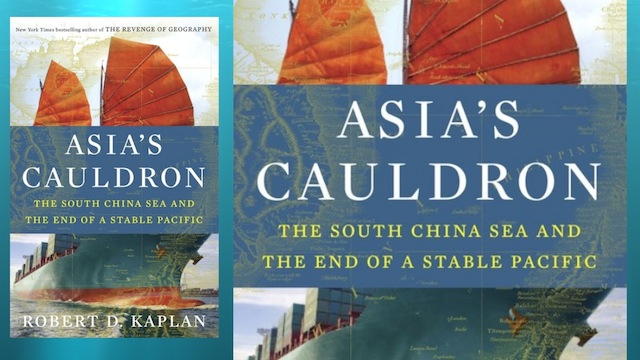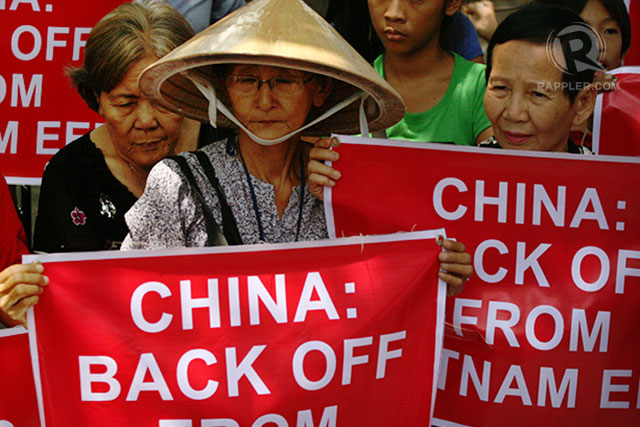The South China Sea shows maritime conflict may not necessarily lead to war but a careful interplay of soft power and hard power, writes Robert Kaplan in his book, Asia's Cauldron

Geopolitical analyst Robert Kaplan begins his book on the South China Sea vividly describing the ruins of
It's a reminder,
Kaplan wrote, of how powers and civilizations rise and fall. He gives the long
view as the region concerns itself with containing China
that is aggressively claiming almost the entire South
China Sea .
"The shadow
of China presently looms large, but if at some point very soon China
dramatically falters, the South China Sea may once again live up to its French
colonial description of Indochina, where China competes on an equal – rather
than dominant – footing with India and other powers and civilizations," he
wrote.
The Philippines filed a case against China before arbitral tribunal at the
Permanent Court of Arbitration. It is counting on the United Nations (UN) body
to peacefully resolve maritime conflicts by telling China
But Kaplan is not
setting his eyes on the ITLOS to stop China Vietnam
"It's all up
to Vietnam
"If China can break off Vietnam
they've won the South China Sea," Kaplan wrote quoting an unnamed US
Kaplan explained:
"Malaysia is lying low, Brunei has solved its problem with China,
Indonesia has no well-defined foreign policy on the subject, the Philippines
has few cards to play despite that country's ingenious boisterousness and
incendiary statements, Singapore is capable but lacks size."
Kaplan is the
chief geopolitical analyst for private global intelligence firm Stratfor and a
foreign correspondent for The Atlantic. Published in February 2014,
the book captures the recent developments in the region. It is available on
Amazon.com.
PH a
'near-failed state'
The Philippines and Vietnam
dominate the two edges of the South China Sea .
Between them are the islands of Spratlys, some of them within the Philippines
"Make no
mistake, the Philippines is
crucial: it dominates the eastern edge of the South China Sea as much as Vietnam does the western edge and China Vietnam
But he looks at
the Philippines
"The
Scarborough Shoal affair made it obvious to the Filipinos – if it wasn't
obvious by then – that they needed a substantial military alliance with the US ," Kaplan wrote, referring to the 2012
standoff that Manila lost to Beijing
But even the US
The Philippine
Navy instead got the decommissioned 1960s US Coast Guard cutters, currently its
most capable ships. (READ: PH Navy asking for 3rd warship from US)
The arbitration
case of the Philippines
Battle-hardened
Vietnam
Tension between China and Vietnam
countries turns scarily dangerous following China 's
provactive move to deploy an oil rig near disputed Paracel Islands
On land,
Vietnamese have launched deadly anti-China riots prompting China
to evacuate more than 3,000 of its citizens out of Vietnam

And there was the
unsuccessful US involvement
in the Vietnam War to prevent a communist take over of South Vietnam
In a good way,
maritime disputes are fought very differently from land disputes that saw the
violent clash of militaries, Kaplan wrote. The South China
Sea shows maritime conflict may not necessarily lead to war but a
careful interplay of soft power and hard power.
Like many ASEAN
countries, Vietnam is
counting on the US to
counter China
"US presence is needed for a free maritime
climate in the South China Sea ," Ngo
Quang Xuan, the foreign affairs commitee vice chairman, was quoted in the book
as saying.
At the same time,
history taught the Vietnamese not to be entirely dependent on another country.
"Because of the failure of the Soviet Union to help Vietnam
A year after Vietnam invaded Cambodia
to oust the pro-Beijing Pol Pot regime, China Vietnam was
counting on its ally, the Soviet Union , to
come to its rescue but was disappointed.
Kaplan also wrote
about the fear of some Vietnamese that the US
"There is
the fear of the US selling Vietnam for the sake of a warmer relationships
with China China
in the late '70s provided the "geostrategic context for China 's invasion of Vietnam
Kaplan curiously
ends his book describing the slums of Borneo, a portion of the South China Sea
where China
"Borneo was
indeed a throwback: a place that, like Champa in Vietnam, challenged my
theories about the present – about how China was the principal reality; and
about how it was all about warship, oil tankers, and modernizing
autocrats," Kaplan wrote.
He raised more
questions. What if China
All these can
change the situation in the region, Kaplan said. "Don't think of the
region as necessarily going in one direction, in other words."
http://www.rappler.com/news/58414-vietnam-china-sea

No comments:
Post a Comment
Note: Only a member of this blog may post a comment.